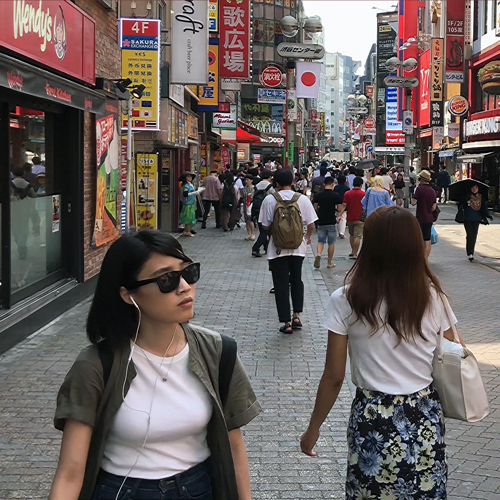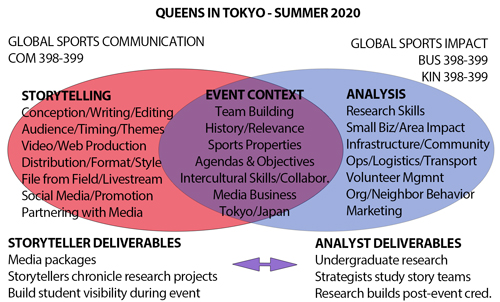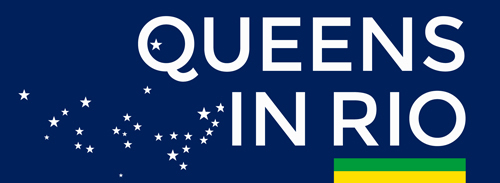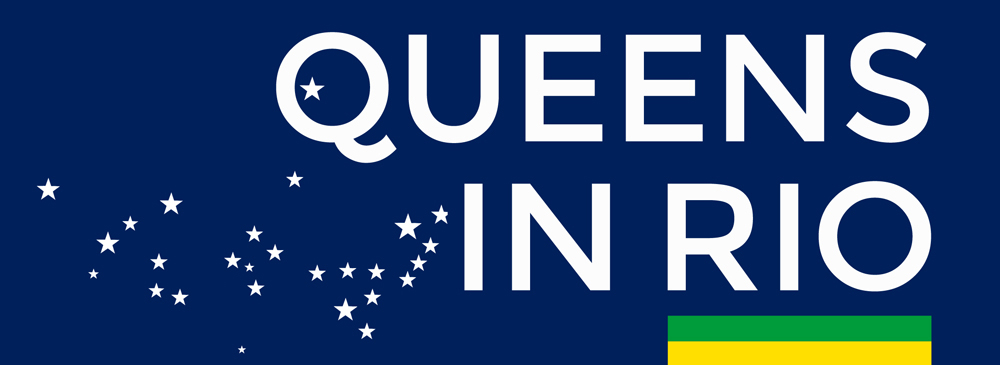
The Tokyo 2020 Olympic Games will be the most high-tech sporting event in human history. Queens students will be there.
Building on Queens’ award-winning experience in Rio de Janeiro, a new project in the John Belk International Program will enable students to understand the impact of the Olympics on Tokyo. They will observe firsthand whether driverless cars, augmented reality, and robotic luggage-handlers will reposition the city as the high-tech capital of the world. Prepare to see what the future looks like.
Queens in Tokyo will train students to compete in the elite ranks of global storytellers and business analysts. One group of student storytellers will produce multimedia coverage in small teams. A second group of student analysts will examine the impact of the Olympics on the city, producing research for undergraduate academic journals. Students from Toyo University — one of Japan’s leading universities — will collaborate, serving as local analysts, producers, translators, and guides. A cross-disciplinary program, Queens in Tokyo is offered through the Knight School of Communication, the Blair College of Health, the McColl School of Business, and the Myrta Pulliam Center for International Education, and Toyo University.
HOW TO JOIN QUEENS IN TOKYO
Queens in Tokyo is a competitive program. Athletes train for years to compete in the Olympics, and the professionals who report, broadcast, produce, manage, and market the games are also at the top of their form. After the JBIP reveal event on March 13, Queens students will apply for their preferred programs, with an April 1 deadline. Program selections will take place in April, with assignments announced late that month. Criteria will include academic performance, experience in relevant courses, and discussion in interviews. Announcing the program in 2018 provides additional time for students to enroll in courses that prepare for the experience and to assemble a portfolio of work.
Strong candidates will possess skills and abilities in the following areas, likely having taken some of the following sample courses. A more detailed list of useful courses is available in this attached file.
ANALYTICAL SKILLS
For example, BUS 210 Business Analytics; CHM 305 Analytical Chemistry; ENV 225 Data Analysis for Natural Sciences, etc.)
RESEARCH SKILLS AND INTERESTS
For example, COM 320 Communications Research; HLT 201 Health Research and Informatics, HSS Social Science Research Methods; PSY 300 Research Methods, etc.
QUANTITATIVE AND QUALITATIVE REASONING
For example, QLC 260/360 Stats, MAT 131 Intro Statistics for Social Science, etc.
STORYTELLING
For example, COM 210 Digital Media Production, student media courses, creative writing, strategic communication, etc.
For storytellers, Digital Media Production (COM 210) is required. Other courses that would help include classes in digital media production, student media, reporting, writing, sport communication and publicity, design, and strategic communication. Internships in media and news production would also help.
For analysts, these include courses in marketing, operations, management, business communication, sports management, sports policy and governance, and facility/event management. Principles of Management (BUS 203) is the prerequisite for applicants from the McColl School. Introduction to Sport Management (KIN 110) is the prerequisite for Blair College applicants. Internships in business and sport management would also help.
Students from other majors, with strong backgrounds in writing, research, quantitative and qualitative reasoning, media production, storytelling, research, or management, may also apply. The Practicum in Queens Student Media (MMS 213), or internships in media, research, analysis, or management also would help.
Highly qualified applicants will submit a portfolio that could include research papers and other writing assignments, multimedia story projects, social media management, or internship experiences.
SPRING 2020 CLASS PREPARATION
In a spring semester 2020 JBIP course, the two groups of students will meet jointly for many classes and separately for others. Analysts in the Global Sports Impact (BUS 398 / KIN 398) course will study research skills, organizational behavior, small business, area economic impact, operations, volunteer management, logistics, and marketing. Storytellers in the Global Sports Communication (COM 398) course will study story conception and development, multimedia development, writing and editing, narrative styles, video and web production, and social media. Both groups will build strong small teams. And together, they will learn context that frames global events such as the Olympic Games, including history, a comparison of sports properties, the infrastructure, investment, and legacy of global events, the business of media, intercultural skills, the topography of Tokyo, and the Asian world. Japan has hosted three editions of the Olympics — the summer games in 1964 in Tokyo, and the winter games in 1972 in Sapporo and in 1998 in Nagano.
FACULTY
Joe Cornelius, associate professor of communication in the Knight School, is an award-winning filmmaker trained at the University of North Carolina School of the Arts and Wake Forest University.
Bob Page, adviser to student media, has led award-winning media programs at multiple editions of the Olympic Games, the NBA and Formula 1. He has a bachelor’s degree in journalism from SMU and an MBA from Queens University of Charlotte.
Dr. Robert Lyons, associate professor of sports management, teaches sports marketing, ethics, governance, and policy in the Blair College of Health, and earned his doctorate in sport management at the University of New Mexico.
Dr. Beth Schneider, assistant professor of strategy, teaches strategy and management at the McColl School of Business, and earned her doctorate in business administration at Durham University in the U.K.

FOR MORE INFORMATION
Joe Cornelius, corneliusj@queens.edu
Bob Page, pageb@queens.edu
Robert Lyons, lyonsr@queens.edu
Beth Schneider, schneiderb@queens.edu
Angie Edwards, edwardsa@queens.edu
Kelen Townsend, townsendk@queens.edu

